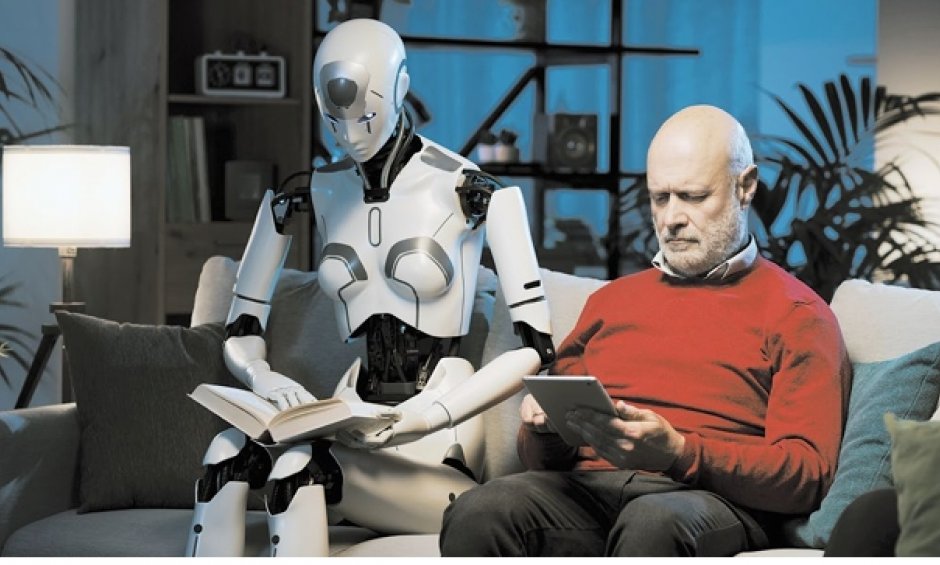Republish from the special edition of Nextdeal (Issue 560)
By George Dimitrakopoulos, Professor, Vice-Rector of Research and Innovation, Harokopio University of Athens
What is Artificial Intelligence?
Artificial Intelligence (AI) is a branch of computer science dealing with creating systems, capable of performing tasks that require human intelligence. These include learning, decision-making, problem solving, pattern recognition and natural language processing.
“Intelligence”, as a word, is related to the ability of understanding and reasoning. The word “artificial: suggests that it is a construction, a mechanism that simulates these abilities without being a biological organism.

George Dimitrakopoulos
Historical Review
The idea of machine intelligence is not new. Since ancient times, Aristotle developed systems of logic that form the basis of modern computer science. However, AI as a scientific branch, was born in the 1950s, when Alan Turing formulated the famous “Turing Test”, a criterion for determining whether a machine can imitate human thought.
Later, various approaches emerged, such as symbolic intelligence (logical rules and expert systems) and Machine Learning (ML), where computers are learning from data, without being programmed with strict rules.
Artificial and Natural Intelligence: Differences and Similarities
Natural Intelligence refers to the intelligence of living organisms, especially humans, including creativity, emotion, intuition, and social awareness. In contrast, Artificial Intelligence operates based on algorithms and data, without self-awareness or emotions.
However, there are similarities, such as the ability to analyze data and optimize decisions. In natural intelligence, decisions are influenced by subjectivity, while in AI they are the result of statistical models and algorithmic calculations.
We all understand today (with our natural intelligence) the great impact of AI in important areas of society and economy. From transportation to medicine, AI is changing the way we work, interact, and make decisions.
ΑΙ Applications
AI applications are extending in numerous industries, with varying levels of automation and autonomy.
1. Transportations and Autonomous Vehicles
AI enables the development of autonomous vehicles, which use sensors and algorithms in order to recognize environmental conditions and make decisions. At the same time, systems such as Google Maps and Waze, use predictive techniques to optimize the traffic management.
2. Health and Medical Diagnosis
AI is used to analyze medical images for the early diagnosis of diseases such as cancer, as well as to discover new drugs through simulations. Systems such as IBM Watson Health analyze millions of medical data in order to provide personalized treatments.
3. Finance and Security
AI is used for the detection of fraud in banking transactions, based on the recognition of suspicious patterns. Also, automated investment negotiation systems use AI in order to predict the market and make financial decisions.
4. Industry and Automation
AI-based robotics enables the automation of production, reducing the cost and increasing accuracy. Smart algorithms help with machine maintenance by predicting when a machine might fail before this actually happens.
5. Education and Human Interaction
Digital assistants (Alexa, Google Assistant) and smart educational systems adapt learning to the needs of each student. At the same time, tools such as Automatic Translation allow easier communication between people speaking different languages.
Advantages, Disadvantages, Risks and Fears
The rapid development of AI offers enormous opportunities, but also creates some serious concerns.
Advantages of ΑΙ
- Automation and efficiency: AI enables complex tasks to be performed with speed and accuracy, reducing human error.
- Improved decision-making: Analyzing large volumes of data (Big Data) in order to make well-documented decisions in business, health, and government policy.
- Personalized services: From personalized ads to content recommendations (Netflix, Spotify), AI tailors the user experience.
- Innovation and new discoveries: AI is used in for the discovery of new drugs, climate prediction, and space exploration.
Disadvantages and Concerns
- Lack of transparency and interpretability: A lot of AI algorithms operate as “black boxes”, without the way of making decisions being clear.
- Bias and discrimination: In case that training data contain biases, AI can reinforce social inequalities.
- Loss of working positions: Automation may replace workers in traditional occupations, particularly in sectors such as processing and services.
- Security and privacy: The reckless use of AI for citizen surveillance, facial recognition, and data collection, raises serious privacy rights issues.
Risks and Fears for the Future
- “Super-intelligent” AI: Some scientists, such as Elon Musk and Nick Bostrom, sound the alarm that a super-advanced AI could surpass humans, leading to unpredictable consequences.
- Armament competition: The development of autonomous military weapons may create new risks concerning global security.
- Abuse by governments and corporations: The control of data and AI by a few large tech companies (Google, Amazon, Microsoft) may create monopolistic practices and social inequality.
The Future of Artificial Intelligence
Next decade will be of pivotal significance for the evolution of AI. Some trends include:
1. Development of a more Explainable/ Interpretable AI
Researchers are working on the developing of models which can transparently explain their decisions, in order to be more reliable for significant applications (e.g. in medicine).
2. Combination of Human and Artificial Intelligence
AI will not completely replace humans, but it will function as a supporting tool in order to enhance the abilities of employees.
3. Legislative and Ethical Framework
The European Union is already developing regulations for “Trustworthy AI”, with the aim of ensuring that algorithms are used responsibly.
4. Quantum Computing and New Technologies
The combination of AI with quantum computers could bring forward revolutionary changes, accelerating big data analysis and encryption.
Read below the article from the special edition of Nextdeal (Issue 560) in electronic format, page 35 (click bottom right to enlarge)





